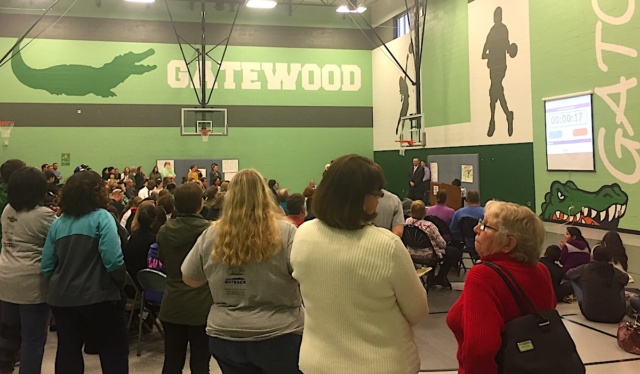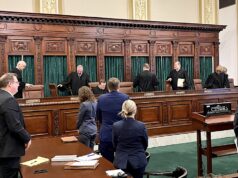

With regard to ongoing talks surrounding OKCPS budget cuts, the Republicans who control the state government are telling us to eat our kids’ education. They — not the local leaders — would starve the schools that serve our poorest children in order to advance charters, vouchers and the entire privatization agenda.
The only way to stop them is to share the pain, unite within it and politically mobilize.
Until we collectively reach that point, however, here are four thoughts about the nature of #oklaed’s latest budget-related crisis.
Blame state budget cuts, not local educators
The first thing to remember when contemplating the OKCPS’s proposed budget cuts is that the Legislature (and the governor) created this mess. Last year, $30 million in reductions were required, and this year’s cuts could exceed $10 million. These deficits were caused by a Republican-controlled state government which has cut per-student funding more than any state in the nation.
And we should not forget that the voters seemed to be on track to ameliorate our education crisis by passing a penny sales tax for teacher pay raises. At the last minute, a fact-free public relations campaign, funded by national as well as state interest groups, swung the election against the initiative.
It’s not a conspiracy
The influence of national and state corporate reformers adds complexity to our local problems. I’ve always tried to see all OKCPS stakeholders as individuals, not as members of reform organizations ranging from Teach for America to the Walton or Broad Foundations or Betsy DeVos’ American Federation for Children. But it is impossible to deny that these reform organizations have pushed a national privatization agenda which contributed greatly to our education woes and which undermined trust.
Moreover, the OKCPS’s proposed school closures would open the door for another round of charter expansions.
Agree or disagree with Superintendent Aurora Lora and her staff, but they are conscientious, sincere and not trying to pave the way for charter takeovers. Neither can we forget that they must follow state law and federal regulations that could make it difficult or impossible to cut the programs that many of us would prefer to sacrifice, as it has become harder for the district to resist charter conversions.
Try not to eat our seed corn
Were it up to me, I would inventory all of the residual programs designed to improve teaching to standardized tests. I’d cut those programs, and proclaim a new era of teaching and learning not directed toward bubble-in accountability.
Sooner or later, if we can’t get more funding, the district will have to choose between the types of our seed corn that we will have to eat. Do we abandon instruction-driven, curriculum-driven programs, or the seeds that we hope will grow into an aligned and coordinated system of socio-emotional supports for students? And that brings us to the question of closing Gatewood and Edgemere elementary schools, which was essentially taken off the table at Thursday night’s OKCPS board meeting.
But the past week’s worth of closure discussions have proven valuable. When I attended the Gatewood community meeting, I realized they have achieved one of the most difficult and most valuable tasks in education: socio-economic integration. Similarly, Edgemere is doing amazing work in creating a full-service community school.
What would it cost to restart such efforts in other high-poverty schools? If the OKCPS had to pull the plug on Gatewood’s and Edgemere’s successes, how much would it harm economic development in central Oklahoma City? How long would it be before another school starts down those worthy but difficult paths? Would other schools duck those challenges and stick with the devil they know — teach to the test?
Hang together or hang separately
As outgoing OKCPS board member Bob Hammack said, the OKCPS sponsored community meetings to discuss the closure proposal and the public’s response were awesome. The meetings were a “great exercise in democracy.”
City Councilman Ed Shadid explained to the Edgemere community meeting why all suffering from cutbacks must be shared across the board. If we let specific groups absorb a disproportionate amount of pain, we’ll be opening ourselves up to divide and conquer. The patrons in closed schools will turn to charters and the ultimate result could be privatization.
That is why a Tulsa idea is intriguing. Tulsa might save $7 million dollars by furloughs. Everyone would suffer. Students who have less time in class, parents would be inconvenienced, and the end-of-the-year paychecks of teachers, administrators, and support staff would be cut.
Furloughs would tell teachers who haven’t received more than vague promises of a raise, and who could be facing attacks on their pensions, that we will take the emergency funds necessary to keep schools open out of their meager paychecks. But it might be the least worst option.
The OKCPS is not currently considering anything so drastic. If we were to make comparable cuts through furloughs, we would be addressing a budget deficit by worsening the trust deficit.
Unless the state increases the required OKCPS cuts to $16 million, the school closure proposal is dead (for this year, at least). The plan made sense only if the extreme austerity that the district now faces is the “new normal.”
But what if we create a new “new normal” where the community rallies behind our children in neighborhood schools? What if the commitment expressed in the community meetings foreshadows a renewed commitment to public education?




















